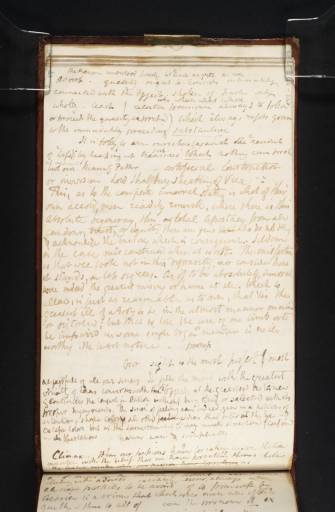The Roman understood liberty at least as well as we. | Adverb, quality ought to consider intimately | connected with the object spoken of partic... only | who which what whose | wholly, least | relative pronouns always to follow | or precede the quality expressed) which always refers gram | to the immediately preceding substantive. | It is folly to arm ourselves (against the accidents | of Life)) by heaping up treasures which nothing can protect | us against but our heavenly Father. artificial Construction | or inversion. Lord Shaftesbury speaking of Vice: | This, as to the complete immoral State is what of their | own accord, men readily remark, where there is this absolute degeneracy, this total apostacy from all | candour, trust, or equity, there are few who do not see, | and acknowledge the misery which is consequent. Seldom | is the case misconstrued when at work. The misfortune | is that we look not in this depravity, nor consider how | it stands, in less degrees. As if to be absolutely immoral | were indeed the greatest misery or harme at all. Which to | allow, is just as reasonable as to own, that is the | greatest ill of a Body to be in the utmost manner maim’ed | or distorted; but that is to lose the use of one limb or to | be impaird in some single organ or member is no ill | worthy. The least notice...Poorness |
Our sight is the most perfect & most | deceitful of all our senses It fills the mind with the greatest | variety of ideas converses with its object at the greatest distance | & continues the longest in action without being tired or satiated with its | proper enjoyments. The sense of feeling can indeed, give us a distance of | extension, shape, color all other [feelings deleted] ideas that enter at the Eye –| except color but at the same time it is very much ... & confirmd | in the operation. Nature care & simplicity | Climax. When our passions have forsaken us, we flatter | ourselves with the belief that we have forsaken them. Better | we flatter ourselves when our passions have forsaken us
These notes are copied or summarised from Hugh Blair’s
Lectures on Rhetoric and Belles-Lettres (1783 and subsequent editions); for his use of this book and perhaps a related source see especially folio 69 verso of this sketchbook (
D07211; Turner Bequest CVI 66a). The observation on the Roman understanding of liberty comes from Blair’s Lecture XI, ‘Structure of Sentences’, and that on sight from Lecture XII with the same title.
David Blayney Brown
July 2010

